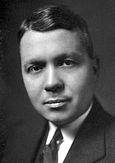Portal:Chicago/Selected biography/164
Harold Clayton Urey (1893 – 1981) was an American physical chemist whose isotope work earned him the Nobel Prize in Chemistry 1934 for the discovery of deuterium. He played a significant role in the atom bomb and made contributions to the development of organic life from non-living matter. Born in Walkerton, Indiana, Urey studied thermodynamics under Gilbert N. Lewis at the University of California. After he received his PhD in 1923, he studied at the Niels Bohr Institute. He was a research associate at Johns Hopkins University before becoming an associate professor of Chemistry at Columbia University. In 1931, work separating isotopes led to the discovery of deuterium. During World War II, focused on uranium enrichment. He headed the Columbia University group that developed isotope separation using gaseous diffusion, the sole method used in the early post-war period. After the war, Urey became professor of chemistry at the Institute for Nuclear Studies, and later Ryerson professor of chemistry at the University of Chicago. Urey speculated that the early terrestrial atmosphere was probably composed of ammonia, methane, and hydrogen. Graduate student Stanley L. Miller showed in the Miller-Urey experiment that, if such a mixture be exposed to electric sparks and water, it can interact to produce amino acids. Work with isotopes of oxygen led to the new field of paleoclimatic research. In 1958, he accepted a post at University of California, San Diego (UCSD), becoming a founding member of UCSD's school of chemistry in 1960.

